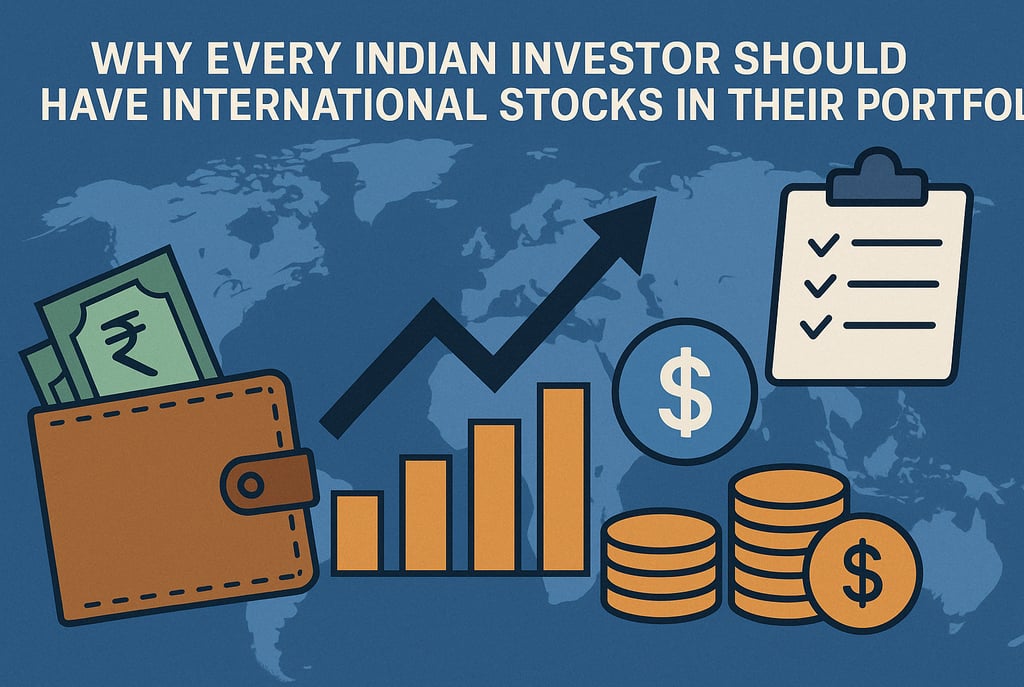Why Every Indian Investor Should Have International Stocks in Their Portfolio
4/19/20253 min read


Why Every Indian Investor Should Have International Stocks in Their Portfolio
For decades, Indian investors primarily focused on domestic equities, believing that India’s growth story alone could deliver outstanding returns. However, while India’s economy remains one of the fastest-growing globally, depending solely on one country’s market carries significant risks.Today, in a globally interconnected financial world, diversifying into international stocks is not just an option—it is essential. In this blog, let’s explore why every Indian investor should look beyond national borders, understand the benefits of global investing, and learn how to add international exposure smartly.
Why Limiting Investments Only to India Is Risky
Although India’s economy is dynamic, concentrating all your investments locally can expose you to several vulnerabilities:
Economic Cycles: Even the fastest-growing economies go through recessions, policy changes, and unexpected disruptions.
Currency Risk: Over the long term, the Indian rupee tends to depreciate against stronger currencies like the U.S. dollar, reducing global purchasing power.
Sectoral Gaps: Certain high-growth industries, such as biotechnology, cloud computing, and aerospace, are dominated by global leaders, not Indian firms.
Market Volatility: Indian markets, while promising, can be more volatile compared to developed market indices like the S&P 500.
Therefore, relying only on domestic equities can leave portfolios vulnerable to localized shocks.
Key Benefits of Investing Internationally
1. Access to Global Industry Leaders
Investing internationally allows you to participate in the success of global giants like Apple, Amazon, Tesla, and Microsoft. These companies are not just market leaders; they are often pioneers in sectors that define the future.
2. Currency Diversification Advantage
Holding assets in stronger currencies, such as the U.S. dollar or Euro, provides a natural hedge against rupee depreciation. Consequently, global investments can enhance the real value of your portfolio over time.
3. Broader Sectoral Exposure
When you invest globally, you gain access to innovative industries largely absent from Indian markets. Whether it is cutting-edge healthcare, artificial intelligence, or sustainable energy, global diversification ensures you are part of multiple growth stories.
4. Reduced Portfolio Volatility
Different markets respond differently to global events. Thus, international exposure acts as a cushion when Indian equities face turbulence, leading to a smoother overall portfolio performance.
How Indian Investors Can Start Investing Globally
Thankfully, investing internationally is no longer complicated for Indian residents. Here are a few accessible methods:
International Mutual Funds: Many Indian AMCs offer funds that invest directly in global equities or global indices.
Indian ETFs with Global Exposure: ETFs tracking the Nasdaq 100 or S&P 500 are available through Indian stock exchanges.
Direct Stock Investments: Several brokers allow Indians to purchase international stocks directly, offering access to companies like Google, Amazon, and Netflix.
Liberalized Remittance Scheme (LRS): Under the RBI’s LRS framework, individuals can legally remit up to USD 250,000 per financial year for global investments.
Clearly, Indian investors now have multiple easy options to build an internationally diversified portfolio.
What to Watch When Investing Internationally
Although global investing offers substantial benefits, it also requires careful planning:
Currency Movements: Fluctuations between the rupee and foreign currencies can impact returns positively or negatively.
Taxation Rules: International gains may attract different tax implications. Understanding double taxation agreements (DTAA) can help optimize after-tax returns.
Market Familiarity: Blindly chasing foreign stocks without research could backfire. Thus, investors must study the markets or choose diversified funds.
Additional Costs: International investing sometimes involves brokerage fees, currency conversion charges, and slightly higher expense ratios.
By being aware of these factors, investors can maximize benefits while minimizing risks.
Should You Replace Indian Stocks with Global Investments?
Certainly not. Global stocks should complement, not replace, Indian equities.
India’s economic fundamentals remain robust, offering substantial opportunities for long-term growth. Nevertheless, blending domestic and international investments creates a better-balanced, risk-adjusted portfolio. A strategic allocation—typically between 10% and 25% toward international assets—helps investors capture global upside while participating in India’s dynamic future.
Conclusion
In today’s interconnected world, restricting investments to one country limits opportunity and increases risk. International diversification empowers Indian investors to participate in global innovation, strengthen portfolios against local shocks, and benefit from currency protection.
By thoughtfully adding global equities, investors can unlock a broader range of growth opportunities while safeguarding long-term financial goals.
Because in investing, embracing the world leads to building true, sustainable wealth.
The world’s best opportunities do not recognize borders. Smart investors shouldn’t either.
Start Investing in International Stocks.
About One Solution
Quick Links
Contact Info
One Solution — Your trusted partner for financial success.
📍 F17, Grand Plaza, Paltan Bazar
Guwahati, Kamrup (M), Assam
India, Pin: 781008
📞 9650072280
© 2025 One Solution. All Rights Reserved.
